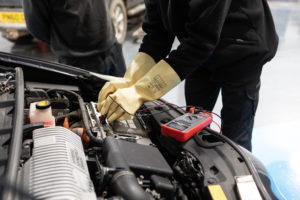This week, Steve Nash, CEO of the IMI, talked to the BBC about the challenges surrounding the uptake of electric vehicles, and the lack of technicians qualified to service them. Read the comment from our CEO, Gavin White, on the problem that Autotech Group has been rising to for some time.

According to the IMI, 90,000 automotive technicians will be required to provide sufficient workforce to service the volume of zero emission vehicles predicted to be on UK roads by 2030. Alarmingly, there is an anticipated shortfall of 35,700 technicians, with 2026 marking the point at which the skills gap will materialise.
The need for EV training for all those who are likely to work on electric vehicles – from service and repair technicians to those working in the roadside recovery and blue light sectors – needs to be addressed as a matter of urgency.
It is a challenge that Autotech Group has been rising to for some time.
Earlier this year we expanded our EV training suite within our Autotech Training division to teach IMI Level 4 Electric/Hybrid Vehicle courses and increased our tranche of qualified EV trainers from 4 to 12.
Our own fleet of electric vehicles also enables us to roll-out our EV training offering to the premises of any garage or business looking to upskill their employees. And it isn’t just training staff to be able to carry out repair work, many organisations, including local authorities, are increasingly booking Level 1 courses to equip their employees with the necessary awareness of EVs if they are to drive an electric pool car.
The ripple effects for electrifying fleets is huge, and organisations need to be prepared.
Throughout this year, we have been training our entire network of temporary vehicle technicians under our recruitment division to IMI Level 3 Electric/Hybrid Vehicle certification, and temporary MOT testers to Level 2. Many of our network have also now been trained to Level 4.
This commitment to our contractors not only ensures that they are ready to meet demand for EV-trained technicians, but it also safeguards them against injury.
We cannot lose sight of the fact that these are high-voltage vehicles, and we have a duty of care to ensure our technicians have the necessary skills to work safely on, or around them. Employers will also find themselves liable if an untrained employee is injured while working around an electric vehicle.
As the electric vehicle car parc increases and begin to filter through to the aftermarket for repair and service works it is vital that, as an industry, we raise awareness of the need for EV training. The Government has not yet regulated this training, which is the reason why I joined the board of the IMI’s TechSafe™ Sector Advisory Group which is helping to drive forward the Electrified Vehicle Professional Standard.
The investment and commitment in creating initiatives to increase the uptake of zero emission vehicles is commendable. However, we MUST collectively work together to meet the 2030 goal of getting 90,000 vehicle technicians trained – failing to do so will have a detrimental impact on the aftermarket.
Article by Gavin White, CEO of Autotech Group

